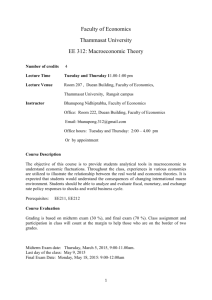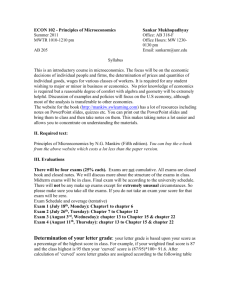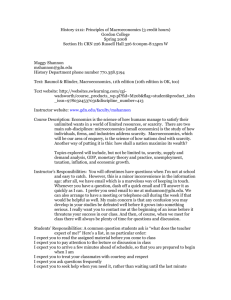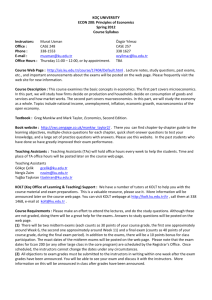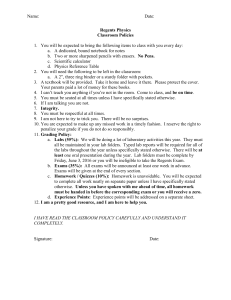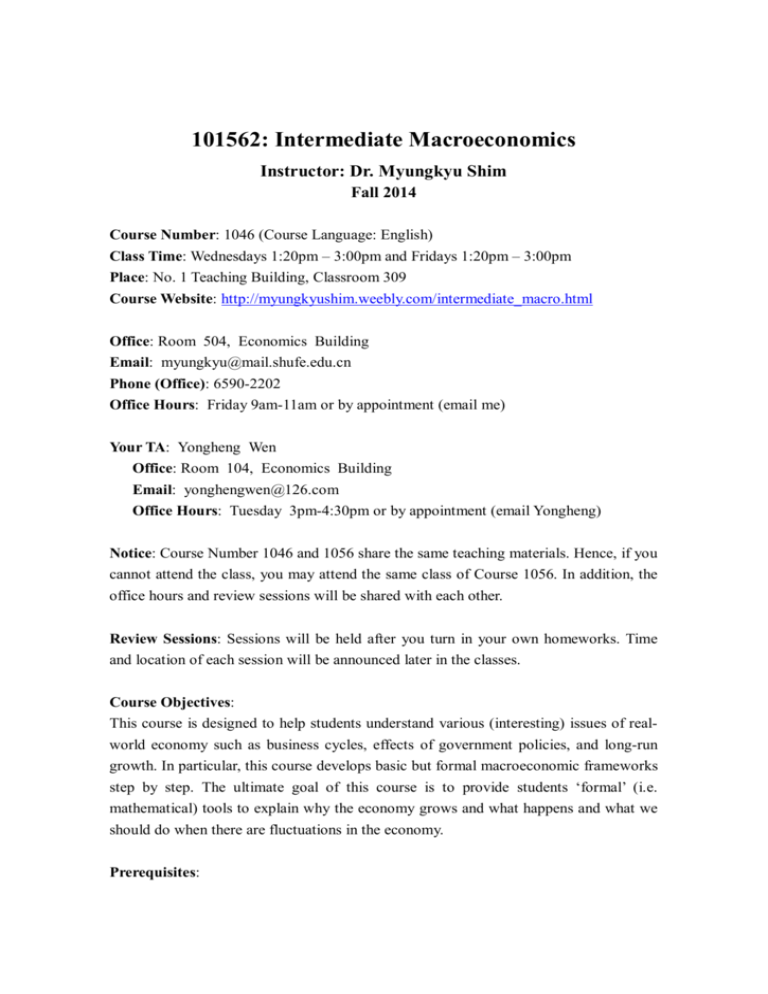
101562: Intermediate Macroeconomics
Instructor: Dr. Myungkyu Shim
Fall 2014
Course Number: 1046 (Course Language: English)
Class Time: Wednesdays 1:20pm – 3:00pm and Fridays 1:20pm – 3:00pm
Place: No. 1 Teaching Building, Classroom 309
Course Website: http://myungkyushim.weebly.com/intermediate_macro.html
Office: Room 504, Economics Building
Email: myungkyu@mail.shufe.edu.cn
Phone (Office): 6590-2202
Office Hours: Friday 9am-11am or by appointment (email me)
Your TA: Yongheng Wen
Office: Room 104, Economics Building
Email: yonghengwen@126.com
Office Hours: Tuesday 3pm-4:30pm or by appointment (email Yongheng)
Notice: Course Number 1046 and 1056 share the same teaching materials. Hence, if you
cannot attend the class, you may attend the same class of Course 1056. In addition, the
office hours and review sessions will be shared with each other.
Review Sessions: Sessions will be held after you turn in your own homeworks. Time
and location of each session will be announced later in the classes.
Course Objectives:
This course is designed to help students understand various (interesting) issues of realworld economy such as business cycles, effects of government policies, and long-run
growth. In particular, this course develops basic but formal macroeconomic frameworks
step by step. The ultimate goal of this course is to provide students ‘formal’ (i.e.
mathematical) tools to explain why the economy grows and what happens and what we
should do when there are fluctuations in the economy.
Prerequisites:
I will assume that all students taking this course have taken Intermediate
Microeconomics in advance. Basic knowledge about calculus is also necessary to
succeed in this class because the nature of economics requires ‘analytical’ skills of a
student. For instance, differentiation and linear algebra will be required to understand
class materials and to solve problems of problem sets and exams.
Textbook:
Main: Gregory Mankiw, Macroeconomics, 7th or 8th edition, Worth Publishers,
2009, 2012
Sub: Olivier Blanchard and David R. Johnson, Macroeconomics, 6th edition,
Pearson/Prentice Hall, 2013
Steve Williamson, Macroeconomics, 5th edition, Addison Wesley, 2013
While Mankiw’s Macroeconomics is the main textbook of this class, I will not
follow the structure of the book. For instance, lectures on Neo-classical models will be
mainly based on Williamson’s Macroeconomics. Hence, I do not require you to
purchase the textbooks though I encourage you to get at least one of the above
textbooks for further study. I further recommend reading various articles from WSJ,
Economist, NY Times and etc.
Class Structures and Evaluations:
The course is basically based on lectures while participations of students are always
welcomed. There will be 5-6 problem sets to help students understand course materials
and prepare for exams. Problem sets will be graded (as total, it will count for 20% of
your grade) and TA will solve the problems in review sessions.
Grade of this course is based on your scores in the exams and in the homework. There
will be two exams in this course: one midterm and a final. The midterm will count for
30% of your grade and the final for the remaining 50%. The final will be cumulative.
Midterm Exam is tentatively scheduled on October 29 (Wednesday) in class.
Class Policy:
1) Attendance: Class attendance is entirely voluntary. Your final grade will be, as noted
earlier, based on your performances in the exams (and homework). While it is not
mandatory to attend the class, it is highly recommended to attend the class to succeed in
this class. For instance, I will not post my lecture note in the website unless I think it is
necessary so that absence from the lecture will not give you anything (you can rely on
your friends, of course!)
2) Exams/ re-grading: The exams are closed-book tests. Any notes, books, study aids,
calculators, and other electronic devices are not allowed during the exams. All the
exams must be taken at the scheduled time and place. Students who arrive late will not
receive extra time to complete their exam. In terms of regarding, there are three rules.
First, a re-grade of one question will involve a re-grade of the entire exam. Second,
exams written in pencil cannot be re-graded. Third, you have to bring your request for a
re-grade in writing, no exceptions. In the form, you should explain carefully the
problem with the grade. Then I will look at the entire exam again.
3) Make-up exams: No make-up exams will be given in this class. A student may be
excused from an exam if he or she provides a doctor’s written note or an appropriate
documentation to Prof. Shim before the exam (except when this is not possible in an
emergency situation). If a student misses the midterm exam, the final grade will be
based on the final exam with an appropriate adjustment.
4) Cheating: Cheating will not be tolerated, and any student who engages in suspicious
conduct will be confronted and subjected to the disciplinary process. If a student is
found to be guilty of academic misconduct, he or she will receive a failing grade on the
exam and/or in the entire course.
5) Effort/extra credit: There is no extra credit to make up for bad performance on the
exams, and I do not count “effort” of a student, which is too arbitrary to measure by its
own nature.
(Tentative) Class Outline:
I. Overview (Week 1)
- Mankiw (Chapter 1,2), Blanchard and Johnson (Chapter 1), Williamson (Chapter
1,2)
II. Long-Run Growth (Week 1-3)
II.A. Exogenous Growth Model: Solow Model (Week 1-3)
- Mankiw (Chapter 3,8,9), Blanchard and Johnson (Chapter 10-12), Williamson
(Chapter 7,8)
II.B. Endogenous Growth Models (Week 3)
- Mankiw (Chapter 9), Williamson (Chapter 8)
III. Keynesian Models
III.A. Short-Run Fluctuations: IS-LM Model (Week 4-5)
- Mankiw (Chapter 10-12), Blanchard and Johnson (Chapter 3-5), Williamson
(Chapter 3)
III.B. Medium-Run Fluctuations: AS-AD Model (Week 6-7)
- Mankiw (Chapter 12, 14), Blanchard and Johnson (Chapter 6,7)
IV. Neo-classical Models
IV.A. One-Period Model of the Macroeconomy (Week 8-9)
- Williamson (Chapter 4,5)
IV.B. Two-Period Model: Consumption-Saving Decision (Week 9-10)
- Williamson (Chapter 9-11)
IV.C. Real Business Cycles Model (Week 10-11)
- Williamson (Chapter 13)
IV.D. Monetary Model: Neutrality of Money (Week 11-12)
- Williamson (Chapter 12)
V. Open Economy: Mundell-Fleming Model (Week 12-13)
- Mankiw (Chapter 13), Blanchard and Johnson (Chapter 18-21)


